In this interview for the International Brain Circulation Series, we interviewed Dr. Xiuzhen Yu, Team Leader of the CEMS Electronic States Microscopy Research Team at RIKEN.
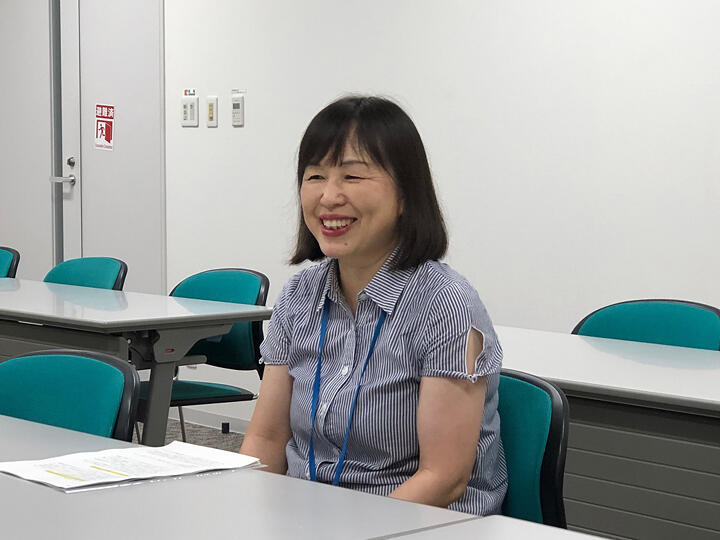
Majored in electronic science due to a fascination for semiconductor technology, and then studied in Japan
Dr. Yu is a researcher in the field of mathematics and physics. She has received numerous domestic and international awards, attracting global attention. In November 2023, she and her mentor, Dr. Yoshinori Tokura of the University of Tokyo, were selected for the Leo Esaki Prize. She came to Japan after receiving her master's degree in China and worked at the National Institute of Advanced Industrial Science and Technology (AIST) and the National Institute for Materials Science (NIMS). She received her PhD from Tohoku University in 2008 and has been a researcher at RIKEN since 2011. In recent years, she has reported significant findings, especially in the observation of skyrmion crystals using an electron microscope.
Yu was born in Qingdao, Shandong Province, China. Partly due to her family background, she wanted to become a scientist since she was a child. With the boom in semiconductors and superconductivity, she majored in electronic science at Jilin University, home to China's leading semiconductor experts at the time.
At the time, Japan was a world leader in semiconductors; Yu hoped to conduct research there. Her husband, a classmate from university, studied at the University of Tokyo as a Japanese government (MEXT) scholarship student. A year later, she moved to Japan after obtaining her master's degree. Life in Japan was tumultuous. She faced a language barrier. A high degree was required for a woman to fully participate in research, and it took her a long time to obtain a doctoral degree.
The turning point came when she participated in the ERATO spin superstructure project run by JST, led by Tokura. Yu said, "I was very lucky. I worked hard there for about five years and learned the joy of research. It was thanks to the support of Professor Tokura that I was able to obtain my doctoral degree."
Yu then studied advanced electron microscopy at NIMS. She joined RIKEN in 2011, following the launch of a new project by Tokura. Since 2013, she has been a researcher at the Center for Emergent Matter Science (CEMS), where he is the director. "Professor Tokura is not only a brilliant researcher, but also a wonderful human being. I feel secure that if I work hard under him, I will not have to worry about anything else. I have nothing but respect for him," said Yu.
Tokura closely watched over the growth of Yu as she worked on her own research and helped graduate students in the group. In 2017, she was promoted to PI (Principal Investigator) with an indefinite-term contract and appointed Team Leader of the Electronic States Microscopy Research Team.
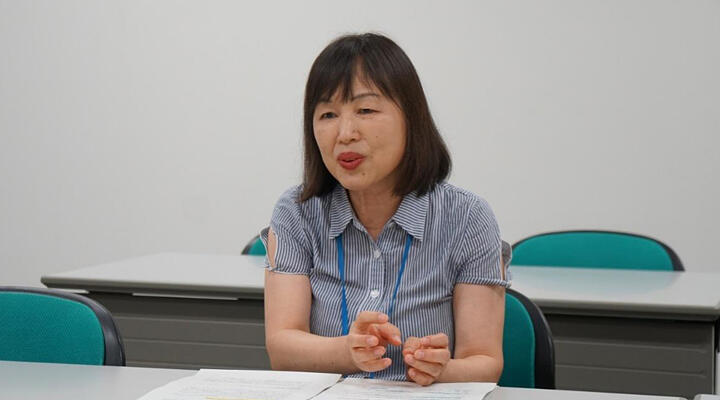
Capturing skyrmions and their vortex-like magnetic structure
Yu's main research at RIKEN involves generating and observing skyrmions using an electron microscope.
The skyrmion was formulated by Dr. Tony Skyrme in England in 1962 to explain the properties of particles other than electrons. The 'on' in skyrmion is the Greek word for particle; skyrmion means 'Dr. Skyrme's particle'. Specifically, it refers to vortex-like magnetic structures, tens to hundreds of nanometers in size, formed by electron spins in solids.
The existence of skyrmions in magnets had been predicted theoretically. In 2009, a German research group identified a skyrmion lattice in an alloy of manganese and silicon. However, it was not a single skyrmion, and the arrangement of electron spins inside the skyrmion was unknown. After reading the German group's paper, Tokura immediately instructed Yu to directly observe skyrmions with an electron microscope. To observe on the nanometer scale, a transmission electron microscope with high magnification is used. Yu, who has been praised by Professor Tokura as having "God's eyes," is a leading expert in this field, having studied electron microscopy under Dr. Yoshio Matsui at NIMS.
At first, Yu found this to be an extremely difficult challenge. Generating and directly observing stable skyrmions with an electron microscope was complex; trial and error continued for some time. She began an experiment using a thin slice of an alloy of iron, cobalt, and silicon with a thickness of approximately 20 nm. A magnetic field was applied to the slice at cryogenic temperatures, which generated skyrmions, and Yu directly observed them using Lorentz electron microscopy. It was an experiment that required great concentration; she was alone in a dark room continuously watching a monitor. One day in 2010, three months after the start of the experiment, a small speck appeared onscreen. This was the world's first successful direct observation of a skyrmion. It was confirmed that skyrmions with a spiral spin structure existed stably as single particles in the thin film. Since then, skyrmion crystals that are stable over a wider temperature range have been designed and fabricated.
Skyrmions are attracting significant attention because they are expected to open new avenues in the field of spintronics as a material with novel physical properties. Applications of their high-density magnetic vortex properties include use in highly sensitive magnetic sensor elements for storage devices such as hard disks. "My role is to observe various materials, confirm the existence of skyrmions, and share this information with researchers conducting applied research," said Yu. (see endnote)
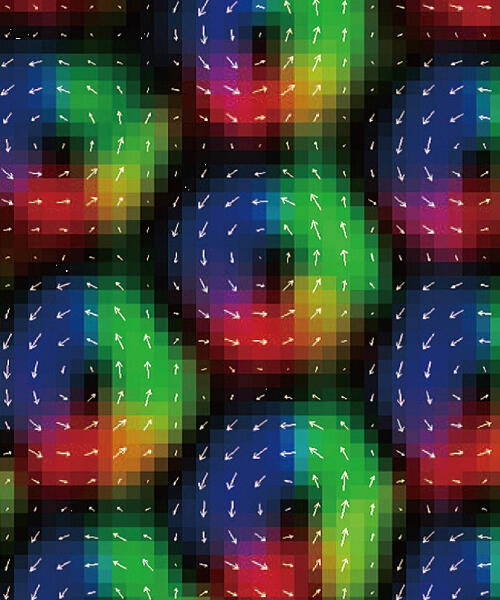
(Source: RIKEN NEWS)
A foreign woman as team leader
Yu's promotion to team leader was in line with RIKEN's policy of increasing the number of female PIs.
She commented, "I think the advantages of having a foreigner as a team leader include easier communication within an international team and easier recruitment of young researchers from overseas."
Her team is international, with members from Argentina, Malaysia, China, Europe, the United States, and Japan. Although English is the main language of communication, she encourages team members to speak in Japanese, even if they make mistakes. "When I first came to Japan, I only knew how to say "hello" in Japanese (konnichiwa). Language is a tool for communication; if you try, you should be able to do it."
Yu says that being a team leader can be a challenge; however, it is also rewarding. "Foreign researchers who come to Japan for the first time often ask, 'Why are there so many rules in Japan?' Certainly, there are many rules in Japan that are different from those in other countries. I take time to explain even trivial matters, such as the strict observance of wearing a mask during the coronavirus pandemic, until each researcher understands. After all, good research cannot be achieved unless the team gets along well with each other. At first, there were numerous problems; however, by taking time to communicate with each other, the team came to understand each other, and research is now proceeding smoothly. Everyone gets along really well now," said Yu.
It is rewarding as a team leader to have the feeling that they are developing global human resources. Many of the members who join Yu's team are young researchers who have just received their doctoral degrees; their stay in the team is relatively short. When one of China's top-level post-doctoral fellows arrived, it was initially thought that she lacked basic skills compared to Japanese students. She was trained on the basics. A year later, she has made significant progress and steadily developed research skills, which led to her winning a tenure-track position at Peking University this spring. "I was very happy that we worked hard together, including overcoming the language barrier, and were able to promote her good points," said Yu.
An American postdoctoral researcher, who took the time to communicate with her in English and who she supervised, was offered a good position in the US at the world's leading electron microscope research institute. "I feel happy to send off a researcher who has received a good position, just like a parent sending off their child," she continued.
Even Japanese team members who are barely able to speak English at first have benefits, such as being able to communicate in English within the team. "Japanese students are cautious about voicing their opinions; those from overseas are quick to present their ideas that strike a chord. They inspire each other and create a synergistic effect. Now I am really happy to be a team leader," says Yu.
RIKEN's Research Environment and International Brain Circulation
In RIKEN President Makoto Gonokami's "RIKEN's Vision on the 2030 Horizon", international brain circulation is described as 'brains without borders,' an interesting expression and Yu herself is an example of this concept.
"RIKEN has a wonderful research environment; There is nothing more I can say about it. After all, RIKEN is Japan's top research institute for natural science. It is focused on globalization and is very open-minded. President Gonokami emphasizes originality, creativity, and international brain circulation. It has several excellent programs that are unique, including the Hakubi Fellows Program, which provides exceptionally talented young researchers with PI positions to work independently as team leaders. The RIKEN Early Career Leaders (ECL) Program was established, further expanding the program. The RIKEN Student Researcher (RSR) Program provides graduate students with stipends and research facilities, and direct guidance from RIKEN scientists. Several universities and research institutes in Japan are still conservative, with restrictions on post-doctoral fellows from abroad operating their equipment. In this respect, RIKEN's openness and internationalization stand out in Japan."
"The Center for Emergent Matter Science (CEMS), which I belong to, is home to many renowned theoretical and experimental researchers and promotes collaborative research by linking theory and experiment. By taking advantage of such a wonderful environment and conducting in-depth cutting-edge research, I dream that my research will contribute to a sustainable society in the future," said Yu.
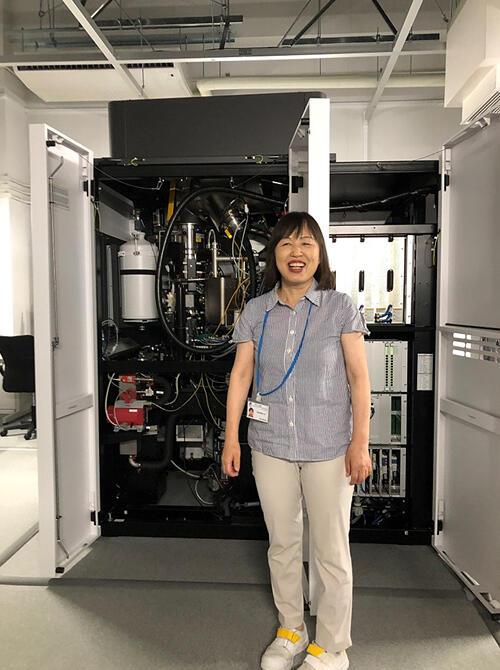
(in front of electron microscope equipment)
The quality of research is more important than the number of scientific papers
The importance of international brain circulation is being reaffirmed in Japan. The decline in Japan's research capabilities is said to be behind this, but Yu is not necessarily pessimistic.
She commented, "Although Japan's research capabilities are said to be declining, it still ranks among the top in the world. China has numerous researchers, and the number of papers is indeed growing rapidly. However, what is important when evaluating research is not the number of papers, but their quality. Research that contributes to the sustainability of human society in the future is important."
Importance of basic skills for researchers
In response to a request for advice for foreign researchers interested in pursuing research activities in Japan, Yu emphasized the importance of basic skills.
"Research in Japan places great emphasis on the basics. I recommend that you properly acquire basic skills. These are the basis for being a researcher. Without basic skills, you cannot judge for yourself whether the research you are doing is correct, and you may be at a loss."
"Things have changed a bit now, but at the time I studied at Jilin University in China, just like in Japan, the emphasis was on basic education. I majored in semiconductor physics; advanced mathematics and quantum mechanics were required subjects. Of course, students are not able to graduate unless they pass these subjects. Thanks to studying hard at university, I was able to acquire the basics of physics. Even when I came to Professor Tokura's difficult field of strong correlation physics, I didn't feel all that uncomfortable. In the world of electron microscopy, my main field of study, it is necessary to have good experimental skills and a sound understanding of condensed-matter physics to conduct excellent research."
"In Japan, I think it is better to thoroughly study the basics before engaging in cutting-edge research. I am not against conducting trendy research, but if that is all you are looking for, you might be better off choosing another country. However, if you truly aspire to do cutting edge research in Japan, I recommend researching the situation in advance to avoid potential disappointment. In any case, you may not succeed unless you have solid basic skills, and there is a risk that you may fail along the way. It is best to be prepared to learn the basics and take the time to do thorough research."
Enjoying Japanese culture and lifestyle is also important
Yu also emphasized the importance of enjoying Japanese culture and lifestyle as well as research when you come to Japan.
"I don't need to tell you the good things about Japan. It is a developed country that has created many brands and is socially very stable, which is attractive. Japan's beautiful climate and environment are also wonderful; Japanese culture is booming around the world. I hope that researchers who come to Japan also enjoy life and culture in Japan. The director of RIKEN always says to new researchers, "Please enjoy your research at RIKEN, as well as Japanese culture."
"I have been in Japan for many years and have been able to make good progress in my research. I think the reason for this is that I originally liked Japanese culture and tried to integrate into this society. I think it is better not to think that because you are a foreigner, or because you only need to do research, you do not need to pay attention to Japanese culture, or you do not need to fit in. By understanding the culture, you will be able to communicate with people around you."
"For example, in Chinese culture, it is polite to leave food uneaten; I was shocked to learn that in Japan it is proper to eat everything on your plate without leaving anything behind. I also thought it was normal to buy tea in plastic bottles at first. I learned from my friends from Europe and Japan that it is better to make tea by myself to protect the environment if possible. I learned a lot of good things about Japan. Of course, China also has many good points. I think it is important to learn about the good points of Japan and remember the good points of other countries."
Gender Issues
Improving the gender balance of researchers is also an issue at RIKEN.
"Indeed, compared to China, there still seems to be a significant barrier to women's participation in society in Japan in general, in research and other fields. This is a social issue and cannot be solved by RIKEN alone. My daughter is a doctor and is currently facing the challenge of balancing work and childcare. It is the same for researchers. There was a time when I was writing papers in bed while taking care of my children. I had to make lunch boxes for my children and didn't have much time to sleep. There is a shortage of childcare facilities. I hope these issues will be resolved."
Future Outlook
We also asked Yu about her future prospects. "It is difficult to say what the future holds, but research at RIKEN is rewarding and I would like to continue my research there. Mainly, I would like to pursue more in-depth research on whether skyrmions can really be used. I would like to approach this from both a theoretical and knowledge perspective and make efforts to apply it to low-power consumption devices. I would be happy if I could contribute to human society in the future."
"International exchange is important for research. RIKEN did not stop recruiting international talent, even during the COVID-19 pandemic. We will continue to communicate with as many researchers as possible, conduct joint research with overseas research groups, and hold international conferences to further contribute to RIKEN's internationalization."
"I have received job offers from China and other countries for some time now, but I am a person who likes 100% pure research. Currently, I am able to do the research I like in a stable manner, and I am still very much interested in continuing my research at RIKEN. Of course, I like China because it is my homeland, and I am happy to see that China is growing so much. However, for my personal activities, I think RIKEN is a good fit for me," she responded with a laugh.
After the interview
After the interview in the conference room, we visited Yu's laboratory. She enthusiastically and thoroughly explained the electron microscopes and monitors that were neatly arranged in the laboratory. We realized once again that in the world of science, the encounter between brilliant minds and advanced equipment leads to new discoveries.
In the interview, Yu reiterated her belief that in Japan, one should enjoy not only research but also life and culture. Her fondness for Japan is pleasing to us as well. However, her fondness for Japan was not always self-evident. I believe that she was helped by the positive efforts she made to discover the good things in Japan and integrate into Japanese society as much as possible.
We would like to send our encouragement to Dr. Yu for her sincere efforts in conducting cutting-edge research and fostering international human resources in Japan.
Interview conducted at RIKEN's headquarters in Saitama, Japan on July 25th, 2023.
Interviewer: Yoshihiro Higuchi, Former Director for Global Strategic Issues, JST
Editing: Toshio Oka, Editor-in-chief of Science Portal Asia Pacific, APRC, JST
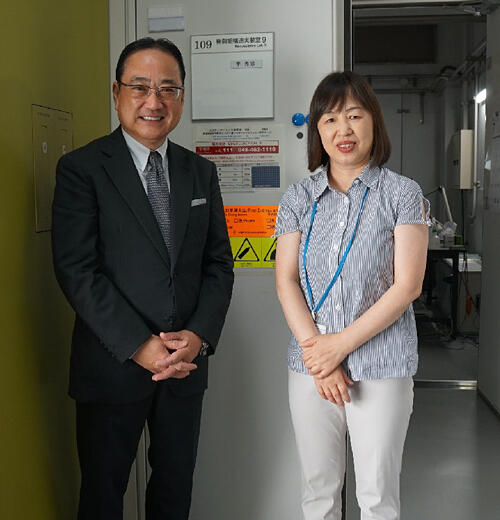
(at the entrance of Dr. Yu's laboratory)
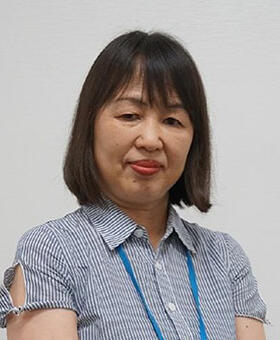
Profile
Xiuzhen Yu
Team Leader, Electronic States Microscopy Research Team, RIKEN
Doctor of Science
In 1990, Yu completed the master's program in the Department of Semiconductors, Graduate School of Electronic Science, Jilin University, China. In 2002, she joined the Tokura Spin Superstructure Project of the Japan Science and Technology Agency (JST) ERATO as a technician. In 2006, she became an engineer in the Advanced Electron Microscopy Group, Advanced Nano Characterization Center, at the National Institute for Materials Science (NIMS). In 2008, she received a doctoral degree from the Department of Physics, Graduate School of Science and Faculty of Science, Tohoku University. She joined RIKEN in 2011 after working as a researcher at NIMS and JST. After working as a postdoctoral researcher in Quantum Science in the Strong Correlation Group at the RIKEN Advanced Science Institute, and as a senior research scientist in the Strong Correlation Physics Research Group in the Strong Correlation Physics Division at the RIKEN Center for Emergent Matter Science (CEMS), she became a team leader of the Electronic States Microscopy Research Team in 2017.
Research Fields: Magnetism, Superconductivity, Strong Correlation Major Awards: Japanese Society of Microscopy Award for scientific paper published in a Japanese journal, Commendation for Science and Technology by the Minister of Education, Culture, Sports, Science and Technology (Awards for Science and Technology), the RIKEN EIHO Award (RIKEN Significant Achievement Award), Nature Nanotechnology Prize, and the Reona Ezaki Award in 2023.
<Overview of RIKEN>
RIKEN, as the only comprehensive research institute for natural sciences in Japan, promotes research across a wide range of fields including physics, engineering, chemistry, mathematics and information science, computational science, biology, and medical science. It was founded in 1917, initially as a private foundation. After the war, RIKEN was reorganized as an independent administrative institution under the jurisdiction of the Ministry of Education, Culture, Sports, Science and Technology (MEXT) in 2003 after having been privatized under the name KAKEN and then became a public corporation. In 2015, RIKEN became a National Research and Development Institute. To disseminate research achievements to society, RIKEN conducts collaborative and funded research with universities and companies, and actively promotes the transfer of intellectual property and other technologies to the industrial sector.
RIKEN website: https://www.riken.jp/en/about/




